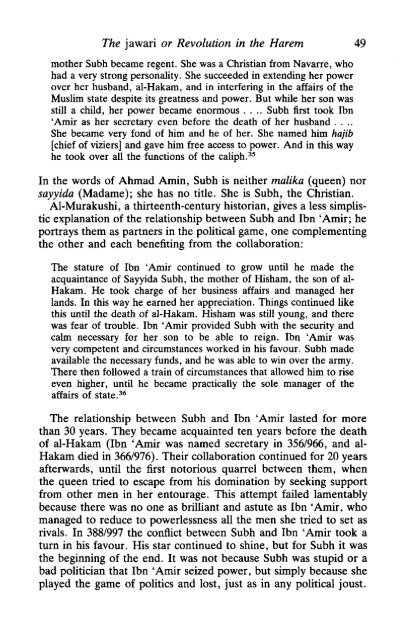Fatima.Mernessi_The-Forgotten-Queens-of-Islam-EN
Fatima.Mernessi_The-Forgotten-Queens-of-Islam-EN
Fatima.Mernessi_The-Forgotten-Queens-of-Islam-EN
Create successful ePaper yourself
Turn your PDF publications into a flip-book with our unique Google optimized e-Paper software.
<strong>The</strong> jawari or Revolution in the Harem 49<br />
mother Subh became regent. She was a Christian from Navarre, who<br />
had a very strong personality. She succeeded in extending her power<br />
over her husband, al-Hakam, and in interfering in the affairs <strong>of</strong> the<br />
Muslim state despite its greatness and power. But while her son was<br />
still a child, her power became enormous .... Subh first took Ibn<br />
'Amir as her secretary even before the death <strong>of</strong> her husband ....<br />
She became very fond <strong>of</strong> him and he <strong>of</strong> her. She named him hajib<br />
[chief <strong>of</strong> viziers] and gave him free access to power. And in this way<br />
he took over all the functions <strong>of</strong> the caliph. 35<br />
In the words <strong>of</strong> Ahmad Amin, Subh is neither malika (queen) nor<br />
sayyida (Madame); she has no title. She is Subh, the Christian.<br />
Al-Murakushi, a thirteenth-century historian, gives a less simplistic<br />
explanation <strong>of</strong> the relationship between Subh and Ibn 'Amir; he<br />
portrays them as partners in the political game, one complementing<br />
the other and each benefiting from the collaboration:<br />
<strong>The</strong> stature <strong>of</strong> Ibn 'Amir continued to grow until he made the<br />
acquaintance <strong>of</strong> Sayyida Subh, the mother <strong>of</strong> Hisham, the son <strong>of</strong> al-<br />
Hakam. He took charge <strong>of</strong> her business affairs and managed her<br />
lands. In this way he earned her appreciation. Things continued like<br />
this until the death <strong>of</strong> al-Hakam. Hisham was still young, and there<br />
was fear <strong>of</strong> trouble. Ibn 'Amir provided Subh with the security and<br />
calm necessary for her son to be able to reign. Ibn 'Amir was<br />
very competent and circumstances worked in his favour. Subh made<br />
available the necessary funds, and he was able to win over the army.<br />
<strong>The</strong>re then followed a train <strong>of</strong> circumstances that allowed him to rise<br />
even higher, until he became practically the sole manager <strong>of</strong> the<br />
affairs <strong>of</strong> state. 36<br />
<strong>The</strong> relationship between Subh and Ibn 'Amir lasted for more<br />
than 30 years. <strong>The</strong>y became acquainted ten years before the death<br />
<strong>of</strong> al-Hakam (Ibn 'Amir was named secretary in 356/966, and al-<br />
Hakam died in 366/976). <strong>The</strong>ir collaboration continued for 20 years<br />
afterwards, until the first notorious quarrel between them, when<br />
the queen tried to escape from his domination by seeking support<br />
from other men in her entourage. This attempt failed lamentably<br />
because there was no one as brilliant and astute as Ibn 'Amir, who<br />
managed to reduce to powerlessness all the men she tried to set as<br />
rivals. In 388/997 the conflict between Subh and Ibn 'Amir took a<br />
turn in his favour. His star continued to shine, but for Subh it was<br />
the beginning <strong>of</strong> the end. It was not because Subh was stupid or a<br />
bad politician that Ibn 'Amir seized power, but simply because she<br />
played the game <strong>of</strong> politics and lost, just as in any political joust.


